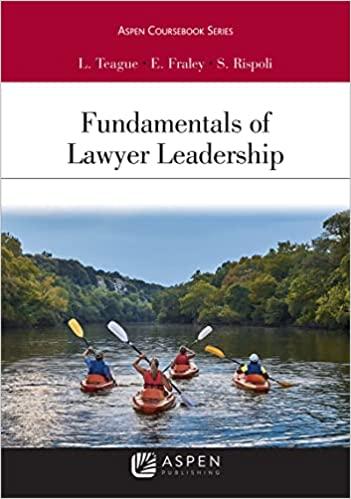Question
Which of the following are examples of collateral? E.Goods and indispensable paper, but not intangibles D.All of the above A.Goods. C.Intangibles. B.Indispensable paper Suppose Jason
Which of the following are examples of collateral?
E.Goods and indispensable paper, but not intangibles
D.All of the above
A.Goods.
C.Intangibles.
B.Indispensable paper
Suppose Jason works as a part-time DJ. On December 31, 2010, he DJs a New Year's office party for KL Industries (a fictional company). They pay Jason his usual rate for the evening, $200. There is no reason to believe the check is not authentic.
Jason does not cash the check immediately. Instead, he folds it up in his wallet and forgets about it. On April 15, 2011, Jason purchases some new DJ equipment from his friend, Zach. After purchasing all the equipment he planned on buying, he spies some lighting equipment he thinks would really help his business. However, he does not have enough cash, and his debit card does not have enough money transferred onto it. Jason asks Zach if he can endorse the back of the check to cover the cost instead. Zach agrees; Jason signs the back of the check and gives it to Zach as payment for the equipment.
Which of the following is TRUE? (Note: multiple selections needed)
To be a holder in due course, the negotiable instrument must be complete and authentic.
A holder in due course must first be a creditor, or a party in possession of an instrument payable to the party or the bearer.
Generally, a check overdue 150 days after its due date.
Generally, a check overdue 90 days after its due date.
When a buyer is found to be in breach of contract, the seller/lessor is not left without recourse. The remedies available to sellers/lessors include the right to cancel the contract or the right to reclaim goods, among other options. Determine whether the action should take place before or after the goods are delivered.
Put Before or After for each answer
Sue for damages
Cancel contract and stop delivery
Sue for price
Sue to reclaim goods
Real defenses apply to ____, whereas personal defenses do not apply to___
A. All parties, holders in due course.
C. Holders, holders.
E. All parties, endorsers.
B. Holders, holders in due course.
D. All parties, holders.
Which of the following prevent a holder from being a holder in due course?
B. Notice that the instrument has been dishonored.
C. Notice that the instrument was issued as part of a series that is in default.
E. Notice that the instrument is overdue or notice that the instrument has been dishonored, but not notice that the instrument was issued as part of a series that is in default.
A. Notice that the instrument is overdue.
D. All of the above.
Step by Step Solution
There are 3 Steps involved in it
Step: 1

Get Instant Access to Expert-Tailored Solutions
See step-by-step solutions with expert insights and AI powered tools for academic success
Step: 2

Step: 3

Ace Your Homework with AI
Get the answers you need in no time with our AI-driven, step-by-step assistance
Get Started


